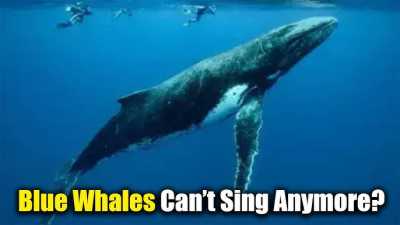Why Blue Whales Are Going Silent And What It Means for the Ocean's Largest Animals
Why Are Blue Whales Going Silent? Scientists Warn It's a Troubling Sign for Ocean Health
In a concerning turn for marine scientists, blue whales — the largest animals on Earth — are singing far less than they used to. This drop in vocalizations has researchers sounding the alarm about what it may signal for the species and the broader health of the world’s oceans.
According to a groundbreaking study published in PLOS ONE, scientists analyzing six years of acoustic recordings have documented a significant decrease in blue whale songs — nearly 40% over the study period. The findings suggest a link between the whales’ silence and a disturbing environmental shift: the disappearance of their primary food source, krill, due to rising ocean temperatures.
Blue Whales and Their Songs: More Than Just Whale Music
Blue whale vocalizations are among the loudest and most far-reaching sounds produced by any animal. These low-frequency songs can travel hundreds of miles underwater and serve critical purposes — from mating calls to long-distance communication between whales.
Unlike other whale species that use complex melodies or social calls, blue whales typically produce a series of repetitive, deep-toned pulses. These songs are most frequent during feeding and mating seasons, making them key indicators of whale behavior and ecosystem stability.
So when these songs start to fade, it's more than just silence — it’s a red flag.
The Data: A Six-Year Decline in Whale Songs
The study’s acoustic data was collected using a hydrophone placed on the ocean floor off the coast of California. This underwater microphone continuously recorded ocean sounds from various marine species. Researchers noticed a sharp decline in the frequency and intensity of blue whale songs over time.
The most notable drop coincided with a major marine heatwave event, which began in 2013 and became known as "The Blob." This massive pool of unusually warm water originated in the Bering Sea and the Gulf of Alaska, eventually spreading down the Pacific Coast of North America.
Climate Change and "The Blob": What Went Wrong
The Blob was unprecedented in scale and intensity. It disrupted marine ecosystems across the northeastern Pacific Ocean, altering the food web and reducing populations of small marine creatures — including krill, a keystone species in the ocean and the primary food source for blue whales.
As krill populations plummeted, so did blue whale song activity.
“When you really break it down, it’s like trying to sing while you're starving,” explained John Ryan, a biological oceanographer at the Monterey Bay Aquarium Research Institute, in an interview with National Geographic. “They were spending all their time just trying to find food.”
Without adequate nutrition, blue whales may lack the energy to sing, a behavior that requires significant physical effort. Singing is also most common during feeding and breeding seasons — both of which were disrupted by the food scarcity caused by the warming waters.
Why the Silence Matters: Impacts on Reproduction and Survival
Blue whale songs aren’t just beautiful — they’re essential for the species’ survival. These vocalizations help males attract mates across vast distances, especially in the vast open ocean where encounters are rare.
With fewer songs being sung, there may be fewer mating opportunities, which could lead to declines in reproduction rates. Combined with other stressors like ship strikes, entanglement in fishing gear, and noise pollution, the silence of blue whales becomes even more concerning.
Additionally, blue whales are already listed as endangered. Any further stress on their population — especially if linked to global warming and food scarcity — could slow or reverse decades of recovery efforts.
What This Means for Ocean Ecosystems
The decline in blue whale songs is more than just a species-specific problem. It may represent a larger ecological warning sign.
Blue whales sit near the top of the marine food chain. When their behavior changes, it can indicate shifts happening throughout the ecosystem — from microscopic plankton to large fish populations. If climate change continues to disrupt ocean temperatures and food sources, more marine species could be affected in unpredictable and potentially irreversible ways.
This case is a reminder that ocean health is deeply connected to climate stability, and changes in the ocean can ripple outward in global and long-lasting ways.
What Can Be Done to Help Blue Whales and Marine Life?
Protecting blue whales — and the ecosystems they depend on — will require a combination of global and local efforts:
1. Addressing Climate Change
The most effective long-term solution is reducing greenhouse gas emissions. Slowing global warming can help stabilize ocean temperatures and preserve krill populations.
2. Establishing Marine Protected Areas
Creating and expanding protected zones in the ocean helps safeguard feeding and breeding grounds for marine life. These areas reduce human disturbance and support biodiversity.
3. Investing in Acoustic and Ecological Monitoring
Continued use of underwater recording technology allows scientists to track changes in marine species' behavior and health. Early detection of anomalies can help inform timely conservation strategies.
4. Raising Public Awareness
Understanding the link between climate change and marine life is key to driving policy and lifestyle changes. The more people learn about blue whales and ocean health, the greater the push for meaningful action.
Final Thoughts: Listening to a Warning from the Deep
The eerie silence of blue whales is not just a loss for marine biologists or whale enthusiasts — it's a message from the ocean itself. As climate change alters the natural rhythms of the sea, these massive animals are quietly telling us that something is wrong.
Their songs are not just echoes in the deep — they’re signals that we ignore at our peril.
Why Blue Whales Are Going Silent — A Climate Warning from the Ocean
Blue whale songs have dropped 40% due to warming oceans and food scarcity. Learn what this silence reveals about ocean health and climate change.
